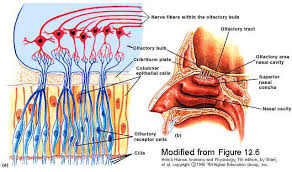记忆方法
将“olfactory”分解为“ol-”(类似于“olive”中的“ol”)和“factory”,想象一个古董橄榄工厂(olive factory),人们在那里制作或嗅闻香气(olfactory指嗅觉)。这种方法通过将单词分解成有意义的部分,帮助记忆其含义。
以上内容由AI生成, 仅供参考和借鉴
中文词源
olfactory 嗅觉的
来自拉丁语olere,闻,嗅,散发气味,词源同odor.-fact,做,使,词源同fact,effect.即闻到气味的,有嗅觉的。字母d,l音变,比较tongue,language.
英语词源
- olfactory
-
olfactory: [17] Olfactory means etymologically ‘making smell’. It was borrowed from Latin *olfactōrius, a derivative of the verb olfacere ‘smell’. This in turn was a blend of olēre ‘smell’ (source of English redolent and related to odour) and facere ‘make’ (source of English fact, faction, etc).
=> odour, redolent - olfactory (adj.)
- 1650s, from Latin olfactorius, from olfact-, past participle stem of olfacere "to get the smell of, sniff," from olere "emit a smell, give off a smell of" (see odor) + facere "to make" (see factitious).
权威例句
- 1. Human mind constantly depend on objects which are taken from visual, auditory, olfactory, gustatory and tactile means.
- 人的心理不断地依赖于从视觉,听觉,嗅觉,味觉和触觉得到的目标。
- 2. This olfactory sense develops in the womb.
- 这一嗅觉在子宫内形成。
- 3. Repellency is not confined to the olfactory senses.
- 防护性不只限于嗅觉感官.
- 4. It arouses their olfactory sense.
- 这唤起了他们的嗅觉.
- 5. Exposure may produce olfactory fatigue or habituation.
- 接触可以引起嗅觉疲劳或成瘾.
